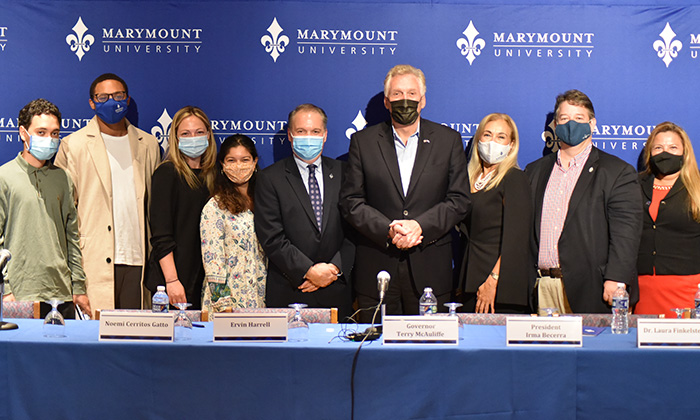“With the start of a new academic year upon us, and with the most students on campus since March of 2020, I remain confident in our ability to deal with any COVID-related challenge that comes our way.”
Those words from Dr. William Bisset, Vice President for Enrollment Management & Student Affairs at Marymount University, set the tone for the institution’s roundtable on Wednesday afternoon, “Marymount University’s Response to COVID-19, Planning for the Coming Year and Ongoing Challenges Faced by Our Community,” held in the University’s Reinsch Auditorium on Main Campus.
Guest speakers in the panel included former Governor of Virginia Terry McAuliffe, as well as Virginia Delegates Elizabeth Guzman and Alfonso Lopez. Joining the panel from Marymount were President Irma Becerra, Dr. Bisset, Dr. Laura Finkelstein (Associate Vice President for Student Health & Well-Being and Title IX Coordinator), Ervin Harrell (President of Marymount’s Student Government Association) and fellow students Noemi Cerritos Gatto and Samuel Lopez.
“For me personally, leading through the challenges the COVID-19 pandemic has brought is the most difficult situation I’ve ever had to deal with in my professional life,” President Becerra said. “But I am blessed that I have an extraordinary Cabinet. Without them, we couldn’t have accomplished what we have over the past 18 months.”
A top issue for discussion was the University’s efforts to vaccinate the community against COVID-19, which includes a mandate for all students, faculty and staff with limited exemptions. The requirement was originally announced in May, and thanks to on-campus clinics, vaccine availability at the Student Health Center and a vaccine promotional campaign, Marymount has achieved a high level of success as the Fall 2021 semester begins with a leading vaccination rate university-wide.
“As of September 7, we have reached a 96 percent vaccination rate on campus – and it’s still going up. Every day, we’re vaccinating more people,” Dr. Finkelstein told the applauding audience. “Get vaccinated – we know it’s the best way to keep ourselves and others safe, and continue to be in person.”
“Institutions have to show leadership, like Marymount University has done,” McAuliffe added. “You’re really an example to the rest of the Commonwealth. We’ve got to get everybody vaccinated, and we have to do whatever we need to do to keep our communities safe.”
In addition to praising the high vaccination rate, the three Marymount students on the panel shared their experiences at each stage of the COVID-19 pandemic – from the initial move to fully remote classes in Spring 2020, to the hybrid model established for the previous academic year, and finally the current, fully in-person learning and living model which returned a few weeks ago.
“It’s been really awesome to see the repopulation of Marymount and see everybody walking around, our buildings being full and noisy again,” Gatto said. “I think students really want to be here in person, and knowing that’s something they really desire, I think all of our students are highly motivated to follow the policies that we have in place.”
“Being able to be in class, see my peers and professors, being able to be there after class and actually talk to them face to face is definitely preferred over anything else,” Lopez added. “And our campus life is much more vibrant…this is what I hoped the University would be like when I first came here.”
Harrell, who in addition to holding the role of SGA President is also a student athlete on the Marymount Men’s Volleyball team, reflected on the return to competition in Spring 2021. After an abrupt halt to sports in March 2020, and a full semester without play the following fall, Saints teams resumed Atlantic East Conference competition this past February.
“As a student athlete, I probably speak for most of us – playing our sport means everything to us, and Marymount made that happen,” Harrell said. “So I’m super grateful for that, and not every school in America can actually say that they were able to continue athletics.”
The pandemic’s negative impacts on education in general were also analyzed through a national lens during the panel. President Becerra told the audience that COVID-19’s disproportionate effects on the socially disadvantaged according to race and ethnicity, income and other factors will continue long after the pandemic ends.
“A high school principal mentioned to me that none of her 2021 Latino male graduates were going to college this fall,” President Becerra explained. “This is why I say that from the higher education perspective, there’s going to be a long-tail effect to the recovery from COVID-19, in particular for people of color. Education has always been described as the ‘great equalizer,’ and it’s important that we continue to offer increased access and personalization so that everyone can be successful and can be resilient to future pandemics.”
Glenn Youngkin, the Republican gubernatorial candidate opposing McAuliffe in Virginia’s upcoming elections in November, has also been invited to speak on Marymount University’s campus.
For more information on Marymount’s ‘Saints Rebound’ plan for the current academic year and how the University has progressed to a high vaccination rate, click here.





